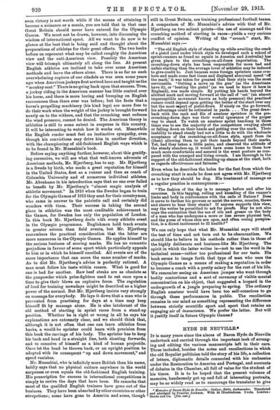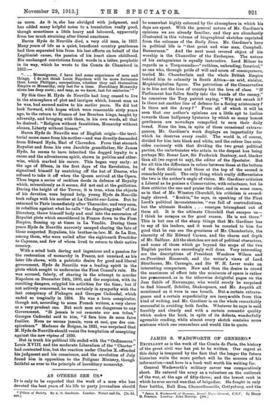HYDE DE NEITVILT51• IT is many years since the nieces
of Baron Hyde de Neuville undertook and carried through the important task of arrang- ing and editing the various manuscripts left in their care. These included, besides the notes and recollections in which the old Royalist politician told the story of his life, a collection of letters, diplomatic details connected with his embassies under the Restoration to America and Portugal, and accounts of debates in the Chamber, all full of value for the student of his times. It is to be hoped that the present volumes of memoirs, handsomely got up and full of interesting portraits, may be so widely read as to encourage the translator to give
• Memoirs of Baron Hyde de Nesmith; : Outlaw, Exile, Ambassador. Translated and abridged by Frances Jackson. With 24 Illustrations. 2 vols. London : Sands and Co. [212. net.]
us more. As it is, she has abridged with judgment, and has added many helpful notes to a translation really good, though sometimes a little heavy and laboured, apparently from too much straining after literal exactness.
Baron Hyde de Neaville died, a very old man, in 1857. Many years of life as a quiet, beneficent country gentleman had then separated him from his last efforts on behalf of the Legitimist cause, the passion of his heart since childhood. His unchanged convictions found words in a letter, prophetic in its way, which he wrote to the Comte de Chambord in
1852 —
". . Monseigneur, I have had some experience of men and things. I do not think Louis Napoleon will he more fortunate than Louis Philippe; usurpations, whether they call themselves Empire or Monarchy, only last for a time. Hereditary Monarchy alone has deep roots ; and may, as we know, last for centuries.'"
By this time M. Hyde de Neuville had long ceased to live in the atmosphere of plot and intrigue which, honest man as he was, had seemed native to hie earlier years. He did but
look. forward, with hopes which were reasonable sixty years ago, to the return to France of her Bourbon kings, taught by adversity, and bringing with them, in his own words, all that
he desired: " Religion without fanaticism, Monarchy without abuses, Liberty without licence."
Baron Hyde de Neuville was of English origin—the terri- torial name came from his mother—and was directly descended from Edward Hyde, Earl of Clarendon. From that staunch Royalist and from his own Jacobite grandfather, Sir James Hyde, he seems to have inherited the dogged loyalty to a cause and the adventurous spirit, shown in politics and other- wise, which marked his career. This began very early: at the age of fifteen, in the first days of the Revolution, he signalized himself by snatching off the bat of Ducros, who refused to take it off when the Queen arrived at the Opera. Thus began a series of reckless deeds in defence of Royalty which, miraculously as it seems, did not end at the guillotine. During the height of the Terror, it is true, when the objects of his devotion were beyond help, young Hyde de Neuville took refuge with his mother at La Charite-sur-Loire. But he returned to Paris immediately after Thermidor, and very soon, in rebellion against what he calls "the degrading yoke" of the Directory, threw himself body and soul into the succession of Royalist plots which smouldered in France down to the First Empire, flaming up at times in La Vendee. During these years Hyde de Neuville narrowly escaped sharing the fate of those suspected Royalists, his brother-in-law, M. de La Rue, among them, who were exiled after the eighteenth Fructidor to Cayenne, and few of whom lived to return to their native country.
With a mind both daring and ingenious and a passion for the restoration of monarchy in France, not unmixed, as his later life shows, with a patriotic desire for good and liberal government, Hyde de Neuville was a leading spirit in the plots which sought to undermine the First Consul's rifle. He was accused, falsely, of sharing in the attempt to murder Napoleon on December 24th, 1800, and the suspicion, with its resulting dangers, crippled his activities for the time; but if not actively concerned, he was certainly in sympathy with the last conspiracy of Pichegru and Georges Cadoudal, which ended so tragically in 1804. He was a born conspirator, though not, according to some French writers, a very clever or a very prudent one. But such men are dangerous to any Government. "Si jamais Is roi remonte sur son trone," Georges Cadoudal said to him, "il fera bien de none faire fusiller. Notts ne serons jamais, eons et moi, que des con- spirateurs." Madame de Boigne, in 1831, was surprised that
M. Hyde de N enville should resist the temptation of conspiring against the new regime of 1830.
But in truth his political life ended with the "Ordinances." Louis XVIII. and the moderate Liberalism of the "Charter" had contented him, but the reaction under Charles X. offended
his judgment and his conscience, and the revolution of July found him in opposition to the Polignac Ministry, though faithful as ever to the principle of hereditary monarchy.



















































 Previous page
Previous page